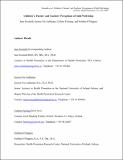| dc.contributor.author | Sixsmith, Jane | |
| dc.contributor.author | Nic Gabhainn, Saoirse | |
| dc.contributor.author | O'Higgins, Siobhan | |
| dc.date.accessioned | 2012-04-18T15:22:50Z | |
| dc.date.available | 2012-04-18T15:22:50Z | |
| dc.date.issued | 2007 | |
| dc.identifier.citation | Sixsmith, J., Nic Gabhainn, S., Fleming, C. & O'Higgins, S. (2007). Childrens', parents' and teachers' perceptions of child wellbeing. Health Education, 107(6), 511-523. | en_US |
| dc.identifier.issn | 0965-4283 | |
| dc.identifier.uri | http://hdl.handle.net/10379/2679 | |
| dc.description.abstract | Purpose - The purpose of this paper is to present an exploration of parents', teachers' and childrens' perspectives on children's understanding of wellbeing with the aim of illuminating and comparing the conceptualisation of wellbeing from these three perspectives.
Design/methodology/approach - The participatory method developed to undertake the study in this paper stems from the adoption of the 'draw and write' technique, with children taking photographs rather than drawing and participating in data analysis. Children aged eight to 12 years took 723 photographs representing wellbeing, while a second set of children grouped the photographs into categories. A third set organised these categories, developing and illustrating through schemata the pattern of relationships between categories. This process was repeated for parent and teacher groups drawing on the photographs taken by the children.
Findings - The findings in this paper show that differences emerged between parents and teachers and children and adults. Parents provided a more detailed conceptualisation than teachers. Children included pets where adults perceived school as being more important in children's wellbeing. The identification of the differing perspectives between children and adults suggests that this approach has enabled children to illuminate their own unique perspective on wellbeing. The paper also demonstrates that children can express complex understandings of abstract concepts.
Originality/value - In the paper the findings reinforce the need to gain children's perspectives rather than relying on adult perceptions of children's perspectives, in order to inform quality service, practice and policy developments. | en_US |
| dc.format | application/pdf | en_US |
| dc.language.iso | en | en_US |
| dc.rights | Attribution-NonCommercial-NoDerivs 3.0 Ireland | |
| dc.rights.uri | https://creativecommons.org/licenses/by-nc-nd/3.0/ie/ | |
| dc.subject | Children (age groups) | en_US |
| dc.subject | Parents | en_US |
| dc.subject | Perception | en_US |
| dc.subject | Teachers | en_US |
| dc.subject | Health Promotion | en_US |
| dc.title | Childrens', parents' and teachers' perceptions of child wellbeing. | en_US |
| dc.type | Article | en_US |
| dc.local.publishedsource | http://dx.doi.org/10.1108/09654280710827911 | en_US |
| dc.description.peer-reviewed | peer-reviewed | en_US |
| dc.contributor.funder | Department of Health and Children (Health Promotion Unit) | en_US |
| nui.item.downloads | 1812 | |


